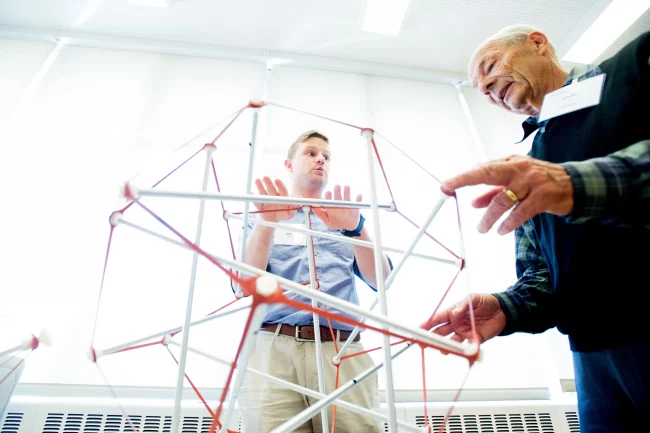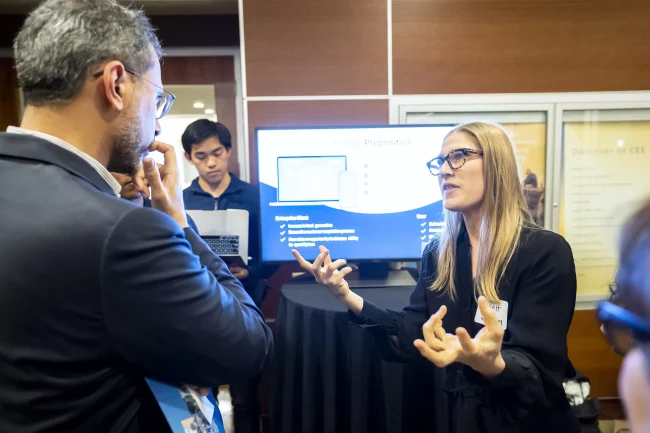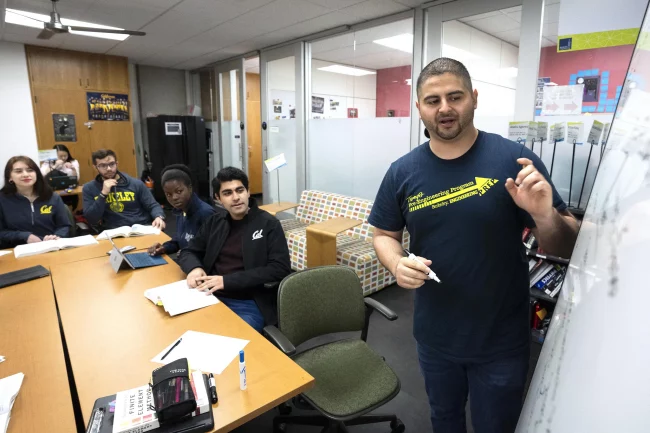BEar News: October 2021
We hope you enjoy these stories of mentorship at Berkeley Engineering, and that they inspire you to reconnect and share your experience with today’s students. Each story lists a specific contact for that program, but if you’re unclear about where and how to get involved, you can reach out to Claire-Marie Kooi at clairemariekooi@berkeley.edu to get started.
Berkeley Mentorship Cohort: Inspiring the next generation

Andrew Yang (B.S.’83 EECS) remembers how vulnerable he felt coming to the United States as an immigrant at 16 and learning English as a second language. But he also remembers how fortunate he was, over the course of his academic career, to have three inspiring mentors who changed his life: his high school swimming coach, his graduate student mentor while he was an undergrad at UC Berkeley and his dissertation adviser (also a Berkeley alum) at the University of Illinois, Urbana-Champaign. Yang’s growing confidence was built upon the advocacy, support and life experiences they provided.
Yang went on to become a highly successful venture capital investor and serial entrepreneur with a background in technology research, product development and business scaling. Most of his startups and investments were later acquired by larger companies. For seven years, he also served as a tenured professor at the University of Washington.
But he never forgot the mentoring support that was so critical to his own success. So in November 2020, he made a generous gift of $1.5 million to help develop and launch the Berkeley Mentorship Cohort (BMC) at the College of Engineering.
Currently in phase one, the BMC is offering peer-to-peer mentoring between undergraduate students but will soon expand to include a full range of faculty and alumni mentorship opportunities as well: individualized mentoring, group mentoring, workshops and community-building events, and staff support and training. Beyond partnering students with effective mentors, the program offers digital libraries of campus resources and literature reviews on effective mentoring practices and platforms.
By helping to create this college-wide resource, Yang feels invested in Dean Tsu-Jae King Liu’s vision to cultivate a more inclusive culture that values and leverages diversity to fully unlock our individual and collective potential.
In spring 2021, he was invited to give an address at the virtual undergraduate commencement ceremony, and he spoke about this need to give back by turning around and sharing one’s experience with the generations that follow. “The best departing gift Berkeley gave me was the realization that I was never the smartest person in the room,” he said. “Success is never a guarantee. It’s also not just about personal glory. What matters most is the positive impact you can make on the people around you. How can you inspire the next generation with your wisdom, experience and knowledge?”
Yang ended his speech with a personal plea to the undergraduate students who were about to become alumni themselves: “If you have a chance to be a mentor to someone who didn’t have the same opportunities or background that you had, please don’t shut your door on them. It’s your chance to give back. Encourage them and guide them so they can also be the best they can be. I believe this is the true Berkeley spirit, to build a truly inclusive culture.”
To learn more about opportunities to give back through the Berkeley Mentorship Cohort, please contact Claire-Marie Kooi at clairemariekooi@berkeley.edu.
Students on their mentors:
The Fung Fellowship forms a coaching cohort

This fall, the Fung Institute launched a coaching program to mentor its Honors Fung Fellows project teams over the next academic year. The institute invited Fung alumni and others with research, industry or community experience to support design teams to address social impact challenges in both public and environmental health.
The new program offers our alumni the chance to help shape the early stages of work in the only U.S. undergraduate program linking human-centered design, digital technology and innovation. Unlike some other mentoring opportunities, this offers a deep and sustained engagement with a small team of students over the course of an entire academic year.
The 32-week fall program runs from September to May. Coaches are asked to provide strategic guidance to their teams; rather than being a team member or project director, they’ll act as an outside sounding board, with the potential to connect their team to a broader professional network. Each coach will be matched to a single team of four to five fellows.
Understanding that our alumni are busy professionals, the Fung Institute has suggested the time commitment be weekly or bi-weekly, with two hour-long meetings and regular 30-minute phone or video conference meetings. Coaches are welcome to increase the level of engagement if they choose to.
Elizabeth Goodman (Ph.D.’13 Information Science), a senior director of design at A1M Solutions, has joined the current cohort as a coach. “I’m committed to creating design for health equity and to working with government programs,” she said. “I really enjoyed teaching when I was a grad student at Berkeley, and I’m hoping to get more students interested in public service careers.”
The success of this model is evident by talking to Fung Fellows who have previously benefitted from mentoring. Nseke Ngilbus is a Fung Fellow studying project management, consumerism and design. Last year, his team was mentored by a CEO in the medical technology field.
“As just one example, we were thinking about incorporating and becoming a company, but our mentor argued against it because we didn’t yet have any cash flow to pay fees and other expenses,” he recalled. “She also advised that it was better for us to remain independent from an organization because we would have complete autonomy to pursue our vision. Without her help, we would have run into many more barriers and wouldn’t have accomplished as much as we did.”
A Fung Fellowship event will be held in December to recognize the program’s participants, as well as to provide a networking opportunity for both coaches and fellows. Coaches will also be invited to a Final Showcase event in May, which will present final projects from the Fung Fellowship and the Masters of Engineering program.
While the deadline for the current cohort of coaches has passed, alumni interest in mentorship is always welcome, and we’d love to include you in a future cohort. Alumni interested in becoming future Fung Fellows coaches can learn more online, or by reaching out to the program director, Jennifer Mangold, at jmangold@berkeley.edu.
Training effective mentors for entrepreneurs

The entrepreneurship and startup culture is not just fueled by innovation and brand-new ideas, it’s also built upon tried-and-true experience, hard-earned wisdom and lessons learned from the past. Built into the startup ecosystem is a solid tradition of mentorship.
“Most successful entrepreneurs point to mentorship as a critical factor in their success,” said Tommaso Di Bartolo, chair of the new Mentoring Studio at the Sutardja Center for Entrepreneurship and Technology (SCET). “Today, most startup accelerators and venture capital firms provide or even require mentorship for their entrepreneurs.”
Di Bartolo is one of a handful of educators at SCET who are identifying current best practices to develop training programs for aspiring startup mentors and mentees.
But while startup hubs like Silicon Valley are filled with “mentors” eager to help, few of them have benefitted from proper training, and there are some less-than-best practices out there, Di Bartolo said. Many mentors simply share their own experience or borrow advice from books rather than helping mentees navigate through their real-life, entrepreneurial challenges, for example.
Good mentoring helps entrepreneurs see solutions and make effective decisions more quickly, while bad mentoring can be plagued by uninformed advice and lack of follow-through. Among the factors that often throw a mentoring situation off track are when the mentor tries to manage the project rather than play a supporting role, or when the mentee is resistant to feedback.
The new Mentorship Studio has just launched the first of several programs to attract and train industry professionals — particularly from UC Berkeley’s alumni network — who will help campus startups develop more quickly and effectively. Those selected will complete a rigorous training program and will be appointed “mentors-in-residence.” The program leadership has developed a kind of taxonomy around both learning and teaching styles.
Ken Singer, the program’s pedagogy lead, said one key to successful mentoring is understanding different styles of learning. “We all have different ways of experiencing the world, and most mentors don’t know how to read or calibrate between them,” he said. “Some are extremely thoughtful. Some create artificial walls — they’re afraid of testing out their idea because they’re risk-averse. The best mentors can guide the team to find the answers on their own, in their own way. When you ask a really well-placed question, it allows the student to use what they know about the problem to naturally discover where the solution is.”
The Mentoring Studio is seeking potential mentors to join the program, as well as future funding to support its growth. Anyone interested in learning more or applying to the program should contact Jen Nice at jennifernice@berkeley.edu.
Mentorship for transfer students

Coming to Berkeley Engineering as a new student is always a challenge: consider the rigorous academic load, the many departments and research centers, and the hundreds of super smart students surrounding you. Now imagine entering this environment as a third-year transfer student, with only two years to learn the ropes and earn your bachelor’s degree. The learning curve can feel overwhelming.
Fortunately, the College of Engineering offers the Transfer Mentor Program (TMP), a year-long initiative designed to provide individualized mentorship, professional development opportunities and academic support to junior transfer students. The popular program helps new students to gain the skills needed to succeed at Berkeley, from building strong relationships to increasing their awareness of available resources.
Victor Zendejas Lopez (B.S.’20 ME) (pictured) was one of those students when he transferred to Berkeley Engineering in 2017. Now an aspiring computational scientist and Ph.D. student at CalTech, he recently returned to campus to make a presentation to mentors currently participating in the Berkeley Mentorship Cohort.
No one in Lopez’s family had ever gone to college or held a professional job. When he graduated from his underserved public high school, his GPA was 2.12. But while working in sales, he began attending community college and, with some mentorship and guidance, transferred to UC Berkeley as a mechanical engineering student. During his senior year, he mentored for half of the year as a student, then continued to mentor as an alumnus.
“I attribute 100% of my academic and personal success to the power of mentorship,” he said. “At Berkeley, I met with an academic counselor who helped me create a work plan for courses in my major that would benefit me in graduate school. And while working at Lawrence Berkeley National Laboratory, my research mentors not only taught me about doing good science but also how to be confident in myself despite my life’s setbacks.”
Like Lopez, many first-generation college students have family and work obligations outside the classroom that makes the transition even more challenging. “I tried to cultivate a culture centered around these struggles so that my mentees would feel comfortable at Berkeley and be more confident in themselves,” he said. “As an engineer and scientist, I will always be involved in mentorship. It’s a cycle, and the best thing I can do is to continue paying it forward.”
The benefits to TMP mentors include developing their own skills and confidence while increasing their sense of belonging in the engineering community. If you’re interested in getting involved with the Transfer Mentor Program, or just want to learn more, please contact Nicole Evans McIntyre at nicolemcintyre@berkeley.edu.
